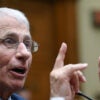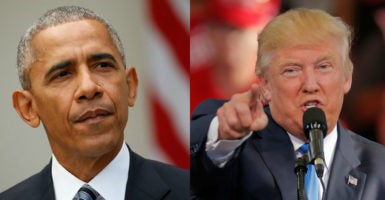As balloons drop and Donald Trump celebrates his hard-fought victory, a select group of political and policy experts will hit the ground running, laying the groundwork for a full-on Trump administration.
For the next three months, Trump’s transition team—separate from his campaign team—will guide the president-elect on his future administration. From budgeting decisions to agenda priorities, and his most important staff hires, it is their job to make the Obama-Trump transition seamless.
For months, this team has already been operating under the assumption that Trump will win—despite how bleak polls sometimes looked.
“When you do the transition team, you have to operate under the assumption that the person’s going to be president, otherwise you can’t do it effectively,” said James Jay Carafano, a member of the Trump transition team and policy expert at The Heritage Foundation.
Having observed two different pre-transition teams in the past, Carafano said the Trump transition team is “very professional” and “will set up the president-elect very well.”
A president-elect’s transition team consists of dozens of advisers and policy wonks who provide guidance on budgeting decisions, White House hires, the national security team, and the president’s all-important Cabinet members. In total, the president-elect has roughly 4,000 political appointments to fill, 1,000 of which require Senate confirmation.
The purpose of the team, Carafano stressed, “is not to make policy.”
“It’s to set up for the president-elect to start to be president.”
A 501c(4), the transition team is a nonpartisan activity that doesn’t interface with the campaign.
“They’re not providing information during the election, they’re basically preparing for the transition and there’s only a limited amount of things you can do because you can’t get too far ahead of your skis,” Carafano said. “Cabinet officials are going to come in, and they’re going to want to make decisions, so basically what you’re doing is teeing up for them all the decisions they need to make before the inauguration.”
By narrowing down the potential new hires, vetting their backgrounds, and assessing the budgets from which they can draw, the transition team—which is being led by New Jersey Gov. Chris Christie—is prepared to provide Trump with advice on what they believe will make his administration great.
Already, they have a roster of potential leaders in the works.
“You really can’t wait until after the election’s over,” said Carafano. “You have to at least have a roster of potential candidates because you have to start the vetting process. You at least have to have a list of people who you might be selecting.”
Transition teams also serve as an important buffer between political parties. Although members of the transition team often have experience inside the government and agencies they’re advising, administrations can differ greatly from one to another.
Speaking Wednesday in the Rose Garden, President Barack Obama paid tribute to the kindness and cooperation shown by President George W. Bush during the transition after his own election in 2008.
“President Bush’s team could not have been more professional or more gracious in making sure we had a smooth transition so that we could hit the ground running,” Obama said, pledging to follow that example in welcoming the Trump team.
Once a president is elected, the current administration works with the president-elect’s transition team to pass the torch. This means that senior staff in the Obama administration will work hand in hand with Trump advisers.
“By all accounts that I’ve heard,” Carafano said, “Obama’s actually been very, very good at that, much in the way that President Bush was very, very good at that.”
The transition team is given access to federal funds through the General Services Administration, an independent government agency that helps manage and support the basic functions of government.
The presidential transition officially begins on Nov. 4, and lasts until Inauguration Day. It’s not uncommon for some members of the transition team to wind up with roles inside the administration, although that’s not the purpose, Carafano said.
“It’s not a job-hunting expedition,” he said. “It’s really to facilitate the transition of power.”































